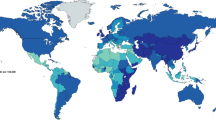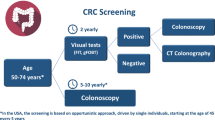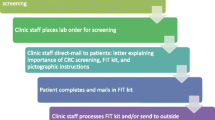Abstract
PURPOSE: The aim of this study was to investigate the number of new colorectal neoplasms during the first seven years after the end of rescreening in a prospective randomized screening study. METHODS: 27,700 inhabitants of Göteborg born between 1918 and 1922 (60–64 years old) who were randomly allocated to a control or a test group in 1982 were followed up. All people in the latter group were offered six fecal occult blood tests and rescreening 16 to 22 months later. RESULTS: One hundred one carcinomas were diagnosed in the screened group and 128 in the control group during the seven years of follow-up. The number of carcinomas in the test group was half that in the control group during the first two years of follow-up, but equal during the rest of the follow-up period. The distribution of carcinomas according to Dukes classification was significantly better among the participants compared with the refusers (P<0.02) but there was no difference in the Dukes distribution when the test and control groups as a whole were compared. The number of adenomas in the two groups during seven years of follow-up was the same. CONCLUSION: The results indicate that screening and rescreening of a population has little influence upon the stage of the carcinomas in the test group compared with a control group during the first seven years of follow-up. The number of carcinomas was higher in the control than in the test group during the follow-up, probably because of a lead time effect during the screening.
Similar content being viewed by others
References
Summary of discussion on colo-rectal cancer screening In: Miller AB, Chamberlain J, Day NE, Hakama M, Prorok PC, eds. Cancer Screening UICC. Cambridge: Cambridge University, 1991:135–8.
Day NE. Surrogate measures in the design of breast screening trials. In: Miller AB, Chamberlain J, Day NE, Hakama M, Prorok PC, eds. Cancer Screening UICC. Cambridge: Cambridge University, 1991: 391–403.
Kewenter J, Björck S, Haglind E, Smith L, Svanvik J, Åhrén C. Screening and rescreening for colorectal cancer. A controlled trial of fecal occult blood testing in 27,700 subjects. Cancer 1988;3:645–51.
Lehman EL. Testing statistical hypothesis. New York: Wiley, 1959.
Maxwell AE. Analyzing qualitative data. London: Methuen, 1961:63–72.
Wahlström J, Witt-Engerström I, Mellquist L, Anvret M, Odén A. Rett syndrome related to fragile X (P22) in caffeine-induced lymphocyte culture. Brain Dev 1990;12:128–30.
Kewenter J, Asztély M, Engarås B, Haglind E, Svanvik J, Åhrén C. A randomised trial of fecal occult blood testing for early detection of colorectal cancer. Results of screening and rescreening of 51,325 subjects. In: Miller AB, Chamberlain J, Day NE, Hakama M, Prorok PC, eds. Cancer Screening UICC. Cambridge: Cambridge University, 1991:116–25.
Thomas VM, Hardcastle JD. An update on the Notingham trial of fecal occult blood screening for colorectal carcinoma. In: Miller AB, Chamberlain J, Day NE, Hakama M, Prorok PC, eds. Cancer Screening UICC. Cambridge: Cambridge University, 1991: 106–15.
Kronborg O, Fenger C, Olsen J. Interim report on randomised trial of screening for colorectal cancer with Hemoccult II. In: Miller AB, Chamberlain J, Day NE, Hakama M, Prorok PC, eds. Cancer Screening UICC. Cambridge: Cambridge University, 1991: 1126–30.
Church TR, Mandel JS, Bond JH,et al. Colon cancer control study: status and current issues. In: Miller AB, Chamberlain J, Day NE, Hakama M, Prorok PC, eds. Cancer Screening UICC. Cambridge: Cambridge University, 1991:83–105.
Tabar L, Fagerberg G, Day NE, Holmberg L. What is the optimum interval between mammographic screening examinations? An analysis based on the latest results of the Swedish two county breast cancer screening trial. Br J Cancer 1987;55:547–51.
Morson B. The polyp-cancer sequence in the large bowel. J R Soc Med 1974;67:451–7.
Stryker SJ, Wolff BG, Culp CE, Libbe SD, Ilstrup DM, MacCarty RL. Natural history of untreated colonic polyps. Gastroenterology 1987;93:1009–13.
Author information
Authors and Affiliations
Additional information
This work was supported by the Swedish Cancer Society, Grant 1765-B89-08XC.
Read in part at the meeting of The American Society of Colon and Rectal Surgeons, San Francisco, California, June 7 to 12 1992.
About this article
Cite this article
Kewenter, J., Brevinge, H., Engarås, B. et al. Follow-up after screening for colorectal neoplasms with fecal occult blood testing in a controlled trial. Dis Colon Rectum 37, 115–119 (1994). https://doi.org/10.1007/BF02047531
Issue Date:
DOI: https://doi.org/10.1007/BF02047531




